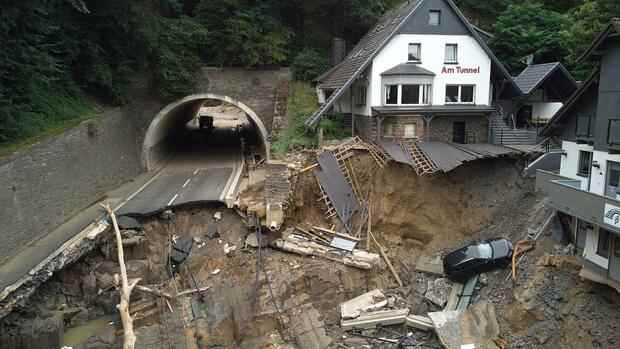A number of companies had already approached the German Chamber of Commerce and Industry (DIHK) with this problem, the Handelsblatt learned from several people entrusted with the topic. In some cases, the lack of insurance would mean that the companies would not receive any bank loans or would only be granted them on poor terms.
But the consequences go beyond reconstruction. According to the findings of most scientists, the flood was only the beginning of increasing storm events in the course of climate change. In addition, there is a fear of increasing, uninsurable natural hazards caused by advancing digitization or pandemics.
Top jobs of the day
Find the best jobs now and
be notified by email.
“The development of the Covid-19 virus and the flood damage have shown us in a terrifying way that in our globalized and networked world, systemic risks can cause serious damage to the German economy at any time,” says a letter from the General Association of Insurance Companies ( GVNW), which is available to the Handelsblatt.
Justice ministers of the federal states should examine compulsory insurance
Politicians are now considering countermeasures. The justice ministers of the federal states are to have the introduction of “compulsory insurance for natural hazards” examined. This is what the federal states of North Rhine-Westphalia and Rhineland-Palatinate, which were particularly affected by the July flood disaster, want to achieve, as a resolution proposal for the Justice Ministers’ Conference on November 11 and 12 in Berlin, which is available to the Handelsblatt, shows.
It states: “In view of the devastating consequences of the flood disaster in July 2021, the justice ministers consider it urgently necessary, in addition to the previous system of state aid and private donations, to examine other models of regulating damage to private residential buildings in the event of natural disasters.”
A spokeswoman for the Federal Ministry of Justice announced that this review will also take into account the insurance situation of companies. To this end, the former working group “Compulsory insurance for natural hazards” should resume its work. The working group of the Justice Ministers’ Conference had already presented a report in 2017, according to which “considerable legal and factual concerns” speak against the introduction of compulsory insurance for natural hazards.
According to the new draft resolution, the working group should now re-examine whether an introduction “continues to conflict with constitutional concerns or whether a different assessment is justified in the meantime due to the current data situation on climatic changes and the insurance market”.
The Rhineland-Palatinate Justice Minister Herbert Mertin (FDP) has doubts despite his own resolution proposal. “It would shift the life risk of a definable group of the population to the entire insured community, although it would currently be possible for practically every owner to take out individual insurance against the corresponding natural hazards,” Mertin told the Handelsblatt. The project would also mean a high administrative burden.
Less than half of homeowners have natural hazards protection
For private individuals, compulsory insurance could solve a fundamental problem: Many homeowners had not taken out insurance against natural hazards from the outset, so the state had to step in.
According to the General Association of the German Insurance Industry (GDV), floods or landslides have not yet been included in the normal residential building insurance with which homeowners protect themselves against storms, hail or lightning strikes.
Less than half of the 17 million homeowners therefore choose to add natural hazard protection. As an alternative to compulsory insurance, the GDV proposes a model according to which customers would have to actively decide against natural hazard protection when taking out insurance.
That should not be an approach to the problems of the economy. The insurance industry is facing the challenge of fewer and fewer calculable risks than the fact that companies do not want to insure themselves. Due to the low interest rates, the risk premiums would have to rise in spheres that are hardly affordable for entrepreneurs in order for it to pay off for the insurer. Business therefore does not consider compulsory insurance or an objection model to be a solution either.
Instead, the GVNW proposes a public-private partnership. With the participation of the state, the risk premium can be kept within an appropriate framework. But it would remain with a voluntary instrument.
Model of Extremus Insurance?
Extremus insurance could serve as a model. The stock corporation was founded after the terrorist attacks of September 11, 2001 by the majority of well-known German insurance companies, including Allianz and Munich Re. After the attacks, insurers and reinsurers around the world no longer found themselves in a position to cover loss events of this magnitude within the framework of conventional contracts.
Business and politics have therefore agreed that insurers of fire and business interruption insurances will be included in the Extremus terror risks. The total annual maximum for compensation is currently nine billion euros.
The shareholders bear the first 2.5 billion euros. The state steps in for amounts beyond this. “Extremus could be expanded with climate and other damage or another company based on this model could be created,” says Jürgen Seiring, managing director of the insurance subsidiary of the German Engineering Federation (VDMA).
In addition to the GVNW, the DIHK should now also want to promote the topic. The organization has therefore approached the current federal government and the coalition negotiators. The associations consider the matter to be decisive for the further development of Germany as a business location. Some say that the coalition agreement of the new federal government should give the topic as much space as climate protection or digitization.
More: Insolvency protection for flood-damaged companies applies until January 2022
